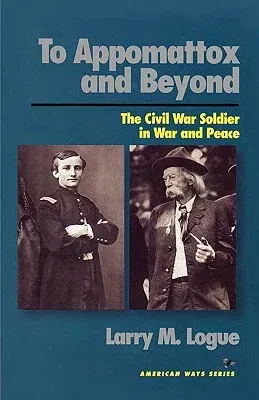Larry M Logue
(Author)To Appomattox and Beyond: The Civil War Soldier in War and PeacePaperback, 1 September 1995

Qty
1
Turbo
Ships in 2 - 3 days
In Stock
Free Delivery
Cash on Delivery
15 Days
Free Returns
Secure Checkout

Part of Series
American Ways
Part of Series
American Ways (Paperback)
Print Length
183 pages
Language
English
Publisher
Ivan R. Dee Publisher
Date Published
1 Sep 1995
ISBN-10
1566630940
ISBN-13
9781566630948
Description
Product Details
Author:
Book Format:
Paperback
Country of Origin:
US
Date Published:
1 September 1995
Dimensions:
20.8 x
13.67 x
1.47 cm
ISBN-10:
1566630940
ISBN-13:
9781566630948
Language:
English
Location:
Chicago, IL
Pages:
183
Publisher:
Weight:
190.51 gm